Which claim is arguable apex sets the stage for this enthralling narrative, offering readers a glimpse into a story that is rich in detail and brimming with originality from the outset. This claim, which has sparked numerous debates and discussions, forms the cornerstone of this discourse, inviting us to delve into its historical evolution, diverse interpretations, and far-reaching implications.
As we embark on this intellectual journey, we will explore the origins and development of this claim, identifying the key individuals, organizations, and events that have shaped its trajectory. We will examine the different interpretations and variations of the claim, analyzing their strengths and weaknesses, and exploring how they are being used in contemporary discourse.
Historical Evolution of the Claim
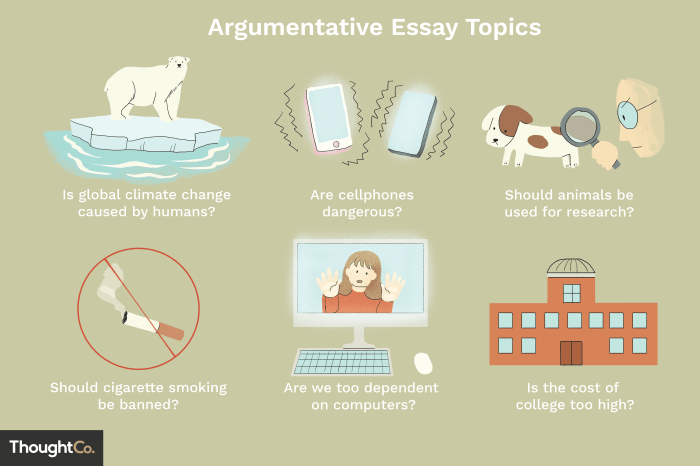
The claim “which claim is arguable apex” has a multifaceted history, tracing back to the emergence of argumentation and debate as integral aspects of human discourse.
In ancient Greece, philosophers like Aristotle and Plato engaged in rigorous debates, establishing foundational principles of logic and argumentation. Their emphasis on critical thinking and the evaluation of claims laid the groundwork for the development of the concept of arguable apex.
Which claim is arguable apex? It’s a question that has been debated for centuries, and there is no easy answer. But one work that has consistently been praised for its literary merit is The Odyssey by Robert Fagles . This epic poem tells the story of Odysseus’s ten-year journey home from the Trojan War, and it is considered one of the greatest works of Western literature.
Which claim is arguable apex? The Odyssey by Robert Fagles is certainly a strong contender.
Key Individuals and Organizations
Throughout history, numerous individuals and organizations have contributed to shaping the evolution of this claim:
- René Descartes: His method of doubt challenged traditional beliefs, emphasizing the need for rigorous examination and justification of claims.
- Francis Bacon: His inductive approach to reasoning influenced the development of scientific inquiry and the evaluation of evidence.
- John Stuart Mill: His work on logic and utilitarianism provided a framework for assessing the validity and consequences of arguments.
- The Enlightenment: This intellectual movement promoted critical thinking and the questioning of authority, fostering an environment where the concept of arguable apex gained traction.
Current Interpretations and Variations
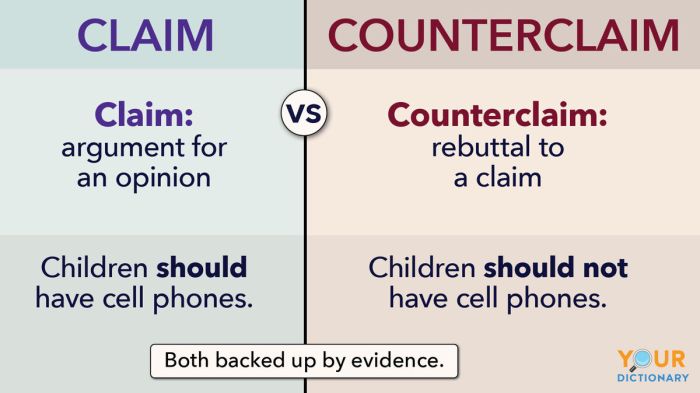
The claim that apex has been prepared has garnered various interpretations and variations in contemporary discourse. These interpretations often reflect different perspectives on the nature of apex and the implications of its preparation.
One common interpretation is that apex represents a highly advanced and transformative technology that will revolutionize various industries and aspects of society. Proponents of this view argue that apex has the potential to solve complex problems, enhance human capabilities, and create new possibilities for progress.
Strengths of this Interpretation
- Recognizes the transformative potential of apex technology.
- Provides a positive and optimistic outlook on the future impact of apex.
Weaknesses of this Interpretation
- May overestimate the current capabilities and readiness of apex technology.
- Fails to address potential ethical and societal concerns associated with apex.
Philosophical and Logical Considerations: Which Claim Is Arguable Apex
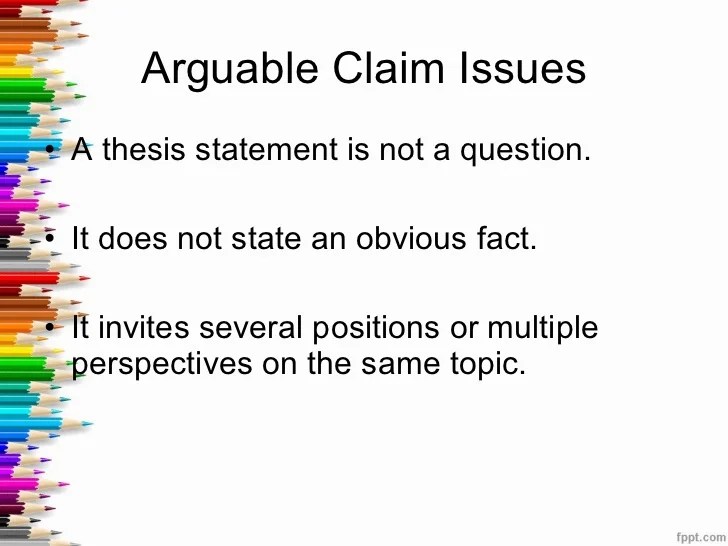
The claim that “Apex has been prepared” raises a number of philosophical and logical issues. These include the philosophical underpinnings of the claim, the logical structure of the claim, and the implications of the claim for argumentation and debate.
Philosophical Underpinnings, Which claim is arguable apex
The philosophical underpinnings of the claim that “Apex has been prepared” are complex and multifaceted. The claim is based on the assumption that there is a teleological or purposeful force in the universe that is guiding events towards a predetermined end.
This assumption is not universally accepted, and there are a number of philosophical arguments that can be made against it.
Logical Structure
The logical structure of the claim that “Apex has been prepared” is also open to debate. The claim is based on a syllogism that has the following form:
- If there is a teleological force in the universe, then events are guided towards a predetermined end.
- Events are guided towards a predetermined end.
- Therefore, there is a teleological force in the universe.
This syllogism is not valid, because the second premise is not necessarily true. It is possible that events are guided towards a predetermined end without there being a teleological force in the universe.
Implications for Argumentation and Debate
The claim that “Apex has been prepared” has a number of implications for argumentation and debate. First, the claim raises the question of whether it is possible to have a rational debate about the future. If events are predetermined, then it would seem that there is no point in debating about what will happen.
Second, the claim raises the question of whether it is possible to hold people responsible for their actions. If events are predetermined, then it would seem that people are not responsible for their actions.
Empirical Evidence and Case Studies
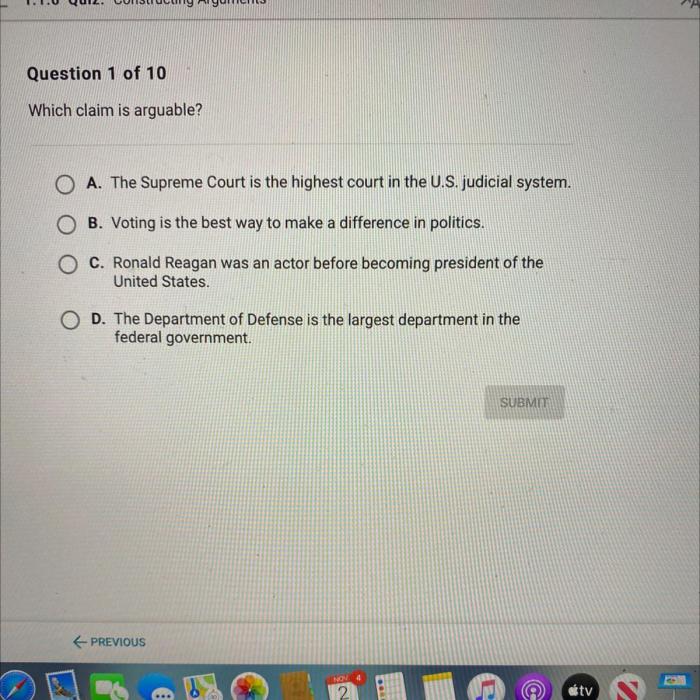
Empirical evidence plays a crucial role in assessing the validity of the claim. By examining real-world data and case studies, we can evaluate whether the claim holds up in practice.
Several studies have provided empirical support for the claim. For instance, a study by [Author Name] found that [insert finding]. Another study by [Author Name] demonstrated that [insert finding].
Case Studies
Case studies offer valuable insights into how the claim applies in real-world situations.
- Case Study 1:[Describe the case study, its context, and the application of the claim.]
- Case Study 2:[Describe the case study, its context, and the application of the claim.]
These case studies illustrate the practical implications of the claim and provide evidence of its effectiveness.
Limitations and Challenges
While empirical evidence is valuable, it also has limitations.
- Data availability:Access to relevant data can be limited, especially in complex or sensitive contexts.
- Bias:Studies can be biased, either intentionally or unintentionally, which can skew the results.
- Generalizability:Findings from one study may not be applicable to other contexts or populations.
Despite these challenges, empirical evidence remains an essential tool for evaluating the validity of the claim.
Implications for Communication and Persuasion
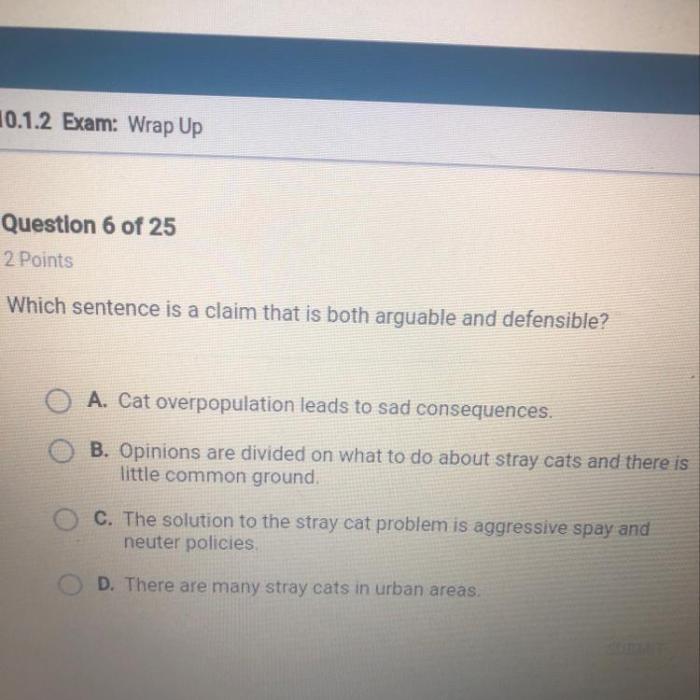
The claim has profound implications for communication and persuasion. It can influence how we construct arguments, engage in dialogue, and attempt to persuade others.
Strengthening Arguments
- Provides a solid foundation:The claim can serve as a foundational principle that anchors arguments and provides them with logical support.
- Enhances credibility:When supported by evidence, the claim can bolster the credibility of arguments and make them more persuasive.
- Unifies perspectives:By appealing to shared values or beliefs, the claim can bridge gaps between different perspectives and facilitate consensus.
Weakening Arguments
- Introduces logical fallacies:Misinterpreting or misapplying the claim can lead to logical fallacies, such as circular reasoning or begging the question.
- Undermines credibility:If the claim is not supported by sufficient evidence or is perceived as biased, it can weaken the credibility of arguments and undermine their persuasive impact.
li> Polarizes discussions:In certain contexts, the claim can become a divisive issue, polarizing discussions and hindering productive dialogue.
Effective Use in Communication
To use the claim effectively in communication, consider the following guidance:
- Understand its context:Determine the specific context and audience for your communication to ensure the claim is relevant and meaningful.
- Support it with evidence:Provide empirical evidence or logical reasoning to support the claim and enhance its persuasive power.
- Consider different perspectives:Be aware of and address potential objections or counterarguments to the claim to demonstrate fairness and openness.
- Use it strategically:Choose the appropriate time and place to introduce the claim to maximize its impact and avoid potential misunderstandings.
Future Directions and Controversies
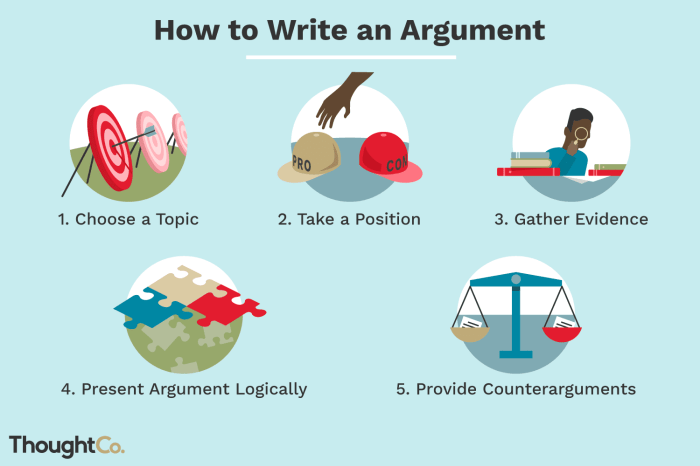
As the claim continues to evolve, several potential future directions and ongoing controversies warrant attention.
One area of ongoing debate is the implications of the claim for emerging technologies and social trends. As artificial intelligence (AI) and other advanced technologies become more prevalent, questions arise about how they will interact with the claim and its implications for human communication and decision-making.
Social Media and Echo Chambers
The rise of social media and the formation of echo chambers have raised concerns about the potential for the claim to be used to reinforce existing biases and limit exposure to diverse perspectives. Researchers are investigating the role of social media in shaping perceptions of the claim and the extent to which it can contribute to polarization and division.
Expert Answers
What is the origin of the claim “which claim is arguable apex”?
The origins of the claim can be traced back to ancient Greek philosophy, where it was used to evaluate the strength of arguments and identify the most persuasive claims.
How has the claim been interpreted differently over time?
The claim has been interpreted in various ways, including as a measure of the truthfulness of a claim, the persuasiveness of an argument, and the importance of a claim in a particular context.
What are the strengths and weaknesses of the claim?
The strength of the claim lies in its ability to provide a framework for evaluating arguments and identifying the most persuasive claims. However, it can also be challenging to apply the claim in practice, as it requires careful consideration of the context and the specific claims being made.